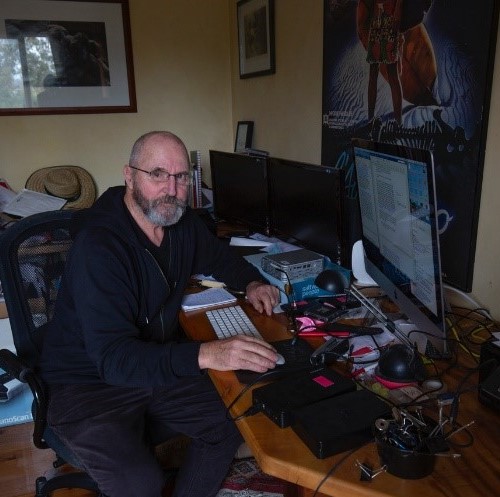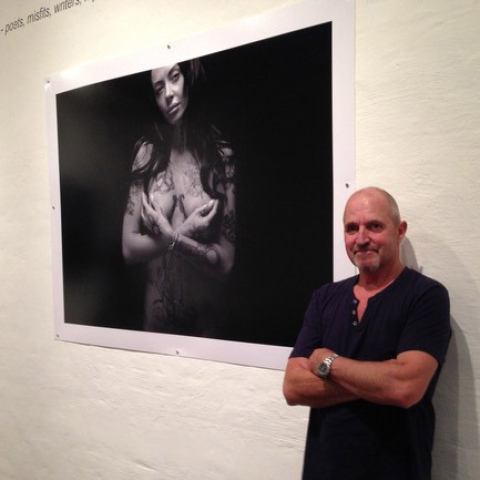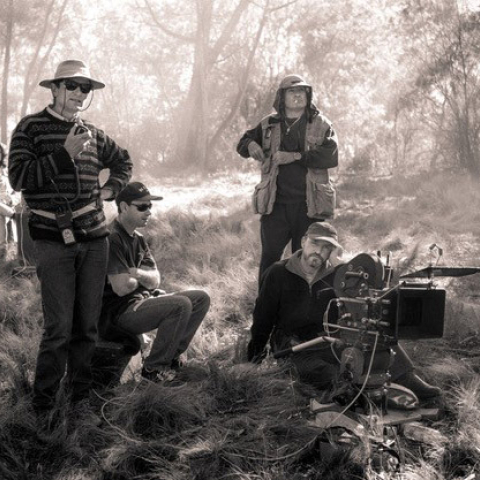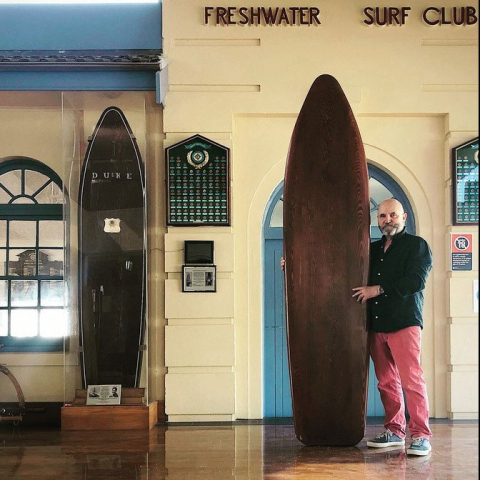
Local creative - John Ogden
Our local creative for December is John Ogden.
Like many professional creatives, John weaves his magic across several artforms, including film, photography and writing. A Northern Beaches’ local for many years, John has embedded himself within our creative community.
He has just released his latest book, Whitewash, completed with the support of a Creative Community Support Grant.
Tell us a little about your connection to the cultural and creative ‘scene’ on the Northern Beaches?
I have been based on the Northern Beaches since 1996, and my youngest child attended local schools. During this time I worked with the Avalon community to build a skate park in the late 1990s. Following a surfing accident in 1998 where I lost an eye, I counselled other surfers (mostly young men who had had similar accidents), and also worked closely with local Aboriginal communities as a mentor for the Gamarada Aboriginal mens’ healing group for many years. The accident was detrimental to my career in the film industry, so I had to transform my life and work. I started out as a photojournalist in the 1970s and it seemed natural to return to writing. In 2012 I had a major retrospective exhibition at the Manly Art Gallery & Museum which was accompanied by the semi-autobiographical book Slightly Dangerous. Cyclops Press is committed to telling Australian stories and has helped other authors publish their first books (e.g. Avalon author Julie Jansen's first novel 'The Crocodile Hotel').
In a nutshell, what has been the impact of the COVID-19 pandemic on your creative practice and business?
In the first instance I had to return just 3 weeks into a 10-week research trip to the Middle East and Ireland at considerable extra expense. On return, I had to undertake 14 days of self-isolation during which time I could not work. I am an accredited member of the Australian Cinematography Society (ACS) and work as a cinematographer and head of department on medium to large productions from time to time. This work suffered under social distancing requirements. My teaching, film production work, and other creative arts income streams completely dried up.
How has the Creative Community Support Grant funding helped you adapt, and enable you to keep working in this challenging environment for creatives?
Since writing and publishing Portraits from a Land Without People and the Saltwater People books I have been developing a project based on an African-Australian man who was a member of the Freshwater SLSC when Duke Kahanamoku visited in the summer of 1914-15. I am drawn to community stories that big publishing companies are not interested in. This work is usually funded by a mix of sponsorship, book sales, and work in other creative spheres, such as producing and directing short films and commercials. With the changes brought about by COVID-19 I had to develop new strategies to complete the final part of the ‘Whitewash’ project. Workers in the creative arts were largely been left out of COVID-19 relief packages, and without assistance many worthy projects failed to see the light of day. Despite the pandemic writers are still writing and I hope one day to see the development of a northern beaches book festival. There are many writers located in this region and a writers festival along the lines of the Byron Bay Writers Festival would generate a lot of interest. These funds have allowed several crucial stages of the 'Whitewash' project to reach completion. The life of a writer (especially for one who chooses projects for their cultural value as against their commercial value) is already difficult without the complications of a pandemic. Failure creates a domino effect. There are several local professionals (e.g. editors, designers) who will also benefited from this project during these tough times..
How do you think the local community will engage and connect with your new book?
Whitewash tells the story about race and identity around the time of Federation and during the visit of Duke Kahanamoku in 1914-15, then follows Bernie Showery into his service in the Great War through to the Spanish flu pandemic in 1919. There are many parallels with the current situation in regard to migration, border protection, and the effects of a global pandemic. The people of the Northern Beaches are widely considered as belonging to a monoculture zone, but Dee Why - lying at the heart of the beaches - is in fact one of the most multicultural suburb in Sydney, while Manly is home to many international visitors. This book highlights the Northern Beaches rich Aboriginal and multicultural history, with the aim of fostering inclusiveness. Whitewash was launched at the Freshwater SLSC on 27 November and will be followed by community events and workshops all along the Northern Beaches to discuss the story and its implications.
You work across various creative disciplines including film, photography and writing, tell us about your current creative project?
I have several books in the pipe that I am developing with local authors, and possibly another in Ireland. There is talk of turning the Shibboleth trilogy (my reality fiction novels) and the Whitewash book into films. My photography takes a back seat while I’m busy with Cyclops Press. I have turned down offers to work on feature film projects in China during these testing times.
Where do you see yourself in 5 years-time as a creative practitioner / writer?
I’m a pretty resilient character with a good work ethic. While some don’t consider writing to be work, it is in fact a most difficult labour to be a successful author. I also struggle against the corporate publishers and distributors who take the oxygen away from publishing companies doing original and transformative work. Having suffered from the collapse of two large distributors I am now seeking more creative ways to get my books into the hands of readers. I always like to mix my creative pursuits so have to be careful not to get locked to the computer, and to find time to get out in the world whether to make films, take photos or just enjoy this short time we have on the blue planet.
Your research trip to the Middle East and Ireland was cut short earlier this year when COVID-19 hit. When it’s safe to travel again, where’s the first place you’d like to visit?
Ireland is high on the list. I also have a strong desire to visit the grave of a great uncle who was shot at Gallipoli and buried on the Island of Limnos..
Gallery
Photos courtesy John Ogden



